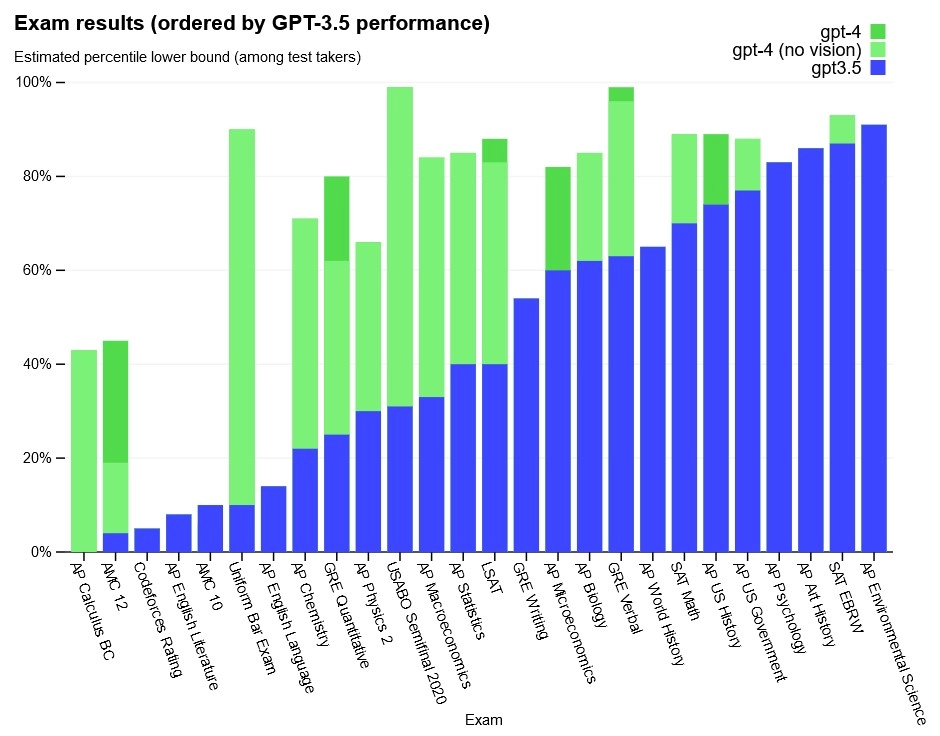OpenAI’s latest iteration of its artificial intelligence language model, GPT-4, has demonstrated impressive results in various academic tests and has even proven its capability to identify vulnerabilities in Ethereum smart contracts.
These advancements have stirred up discussions about the potential of GPT-4 and its implications for the global education system and the crypto industry.
ChatGPT-4 VS. ChatGPT-3.5
GPT-4, surpasses its predecessor, GPT-3.5, in reliability, creativity, and the ability to process more nuanced instructions. While the distinction between the two models may not be immediately apparent in casual conversations, GPT-4 truly excels when tackling complex tasks.

On March 14, OpenAI revealed that GPT-4 scored in the top 10% on a simulated bar exam and ranked in the 88th percentile on the LSAT exam.
These scores would make the AI eligible for admission to a top 20 law school in the United States, a significant improvement from its predecessor, ChatGPT 3.5, which only scored in the bottom 40%.
In addition to its impressive legal aptitude, GPT-4 achieved above-average scores in various high school tests, such as the SAT Evidence-Based Reading & Writing and SAT Math exams, as well as AP Biology, Chemistry, and Physics 2.
However, it posted only average scores in AP Calculus and struggled in English literature exams.
OpenAI’s ChatGPT-4 focuses on content and sensitive requests
OpenAI has made notable improvements, including reducing GPT-4’s likelihood to refuse requests for synthesizing dangerous chemicals and making it 82% less likely to respond to “disallowed” content.
Furthermore, GPT-4 now adheres to OpenAI’s policies on sensitive requests, such as medical advice and self-harm-related topics, 29% more often.
Despite GPT-4’s limitations, such as lacking knowledge of events after September 2021 and occasionally making simple reasoning errors, its impact across various industries is significant.
GPT-4’s impact across industries
Companies like Microsoft, Stripe, Duolingo, Morgan Stanley, and Khan Academy have already adopted GPT-4 for an array of applications, ranging from chatbot technology and customer support assistance to language learning and automated tutoring.
OpenAI partnered with Microsoft to develop a “supercomputer” in the Azure cloud to train GPT-4, marking a new era of AI-driven solutions with the potential to revolutionize industries worldwide.
GPT-4’s role in crypto
What has caught the attention of the crypto community is GPT-4’s ability to identify security vulnerabilities in Ethereum smart contracts.
Conor Grogan, former Coinbase director, shared his experience inserting a live Ethereum contract into GPT-4, which the AI immediately analyzed and pointed out several potential security risks and exploitable areas.
I dumped a live Ethereum contract into GPT-4.
In an instant, it highlighted a number of security vulnerabilities and pointed out surface areas where the contract could be exploited. It then verified a specific way I could exploit the contract pic.twitter.com/its5puakUW
— Conor (@jconorgrogan) March 14, 2023
Nick Almond, the founder of FactoryDAO, expressed concerns on Twitter about GPT-4’s capabilities “scaring people” and potentially “collapsing” the global education system. This highlights the broader implications of the AI’s advancements and how they might reshape various industries in the future.
https://twitter.com/DrNickA/status/1635697178969505808
Meanwhile, Rowan Cheung, the founder of AI newsletter The Rundown, demonstrated GPT-4’s versatility by showcasing a video of the AI transcribing a hand-drawn mockup of a website into code.
I just watched GPT-4 turn a hand-drawn sketch into a functional website.
This is insane. pic.twitter.com/P5nSjrk7Wn
— Rowan Cheung (@rowancheung) March 14, 2023
These recent developments in GPT-4’s capabilities signal a new era of AI technology that has the potential to transform industries, including the blockchain and cryptocurrency world. As AI continues to evolve, its impact on the global landscape, from education to technology, will become increasingly profound.